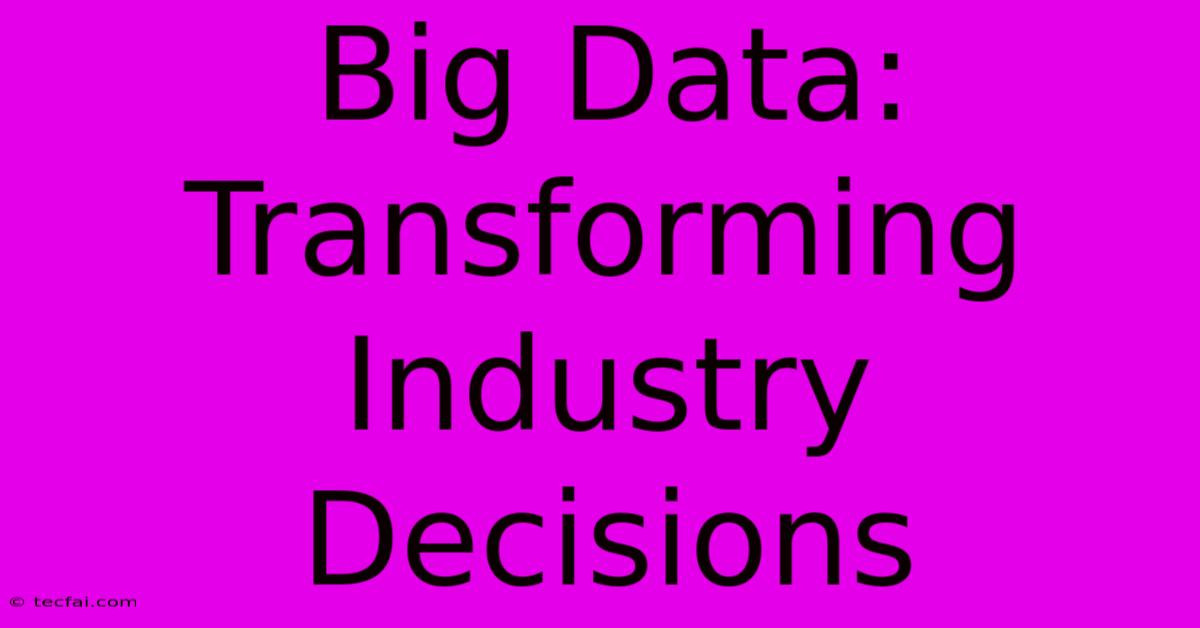Big Data: Transforming Industry Decisions

Discover more detailed and exciting information on our website. Click the link below to start your adventure: Visit Best Website tecfai.com. Don't miss out!
Table of Contents
Big Data: Transforming Industry Decisions
Big data is no longer a futuristic concept; it's the present, profoundly reshaping how industries operate and make critical decisions. The sheer volume, velocity, and variety of data available today offer unprecedented opportunities for businesses across all sectors. But harnessing its power requires a strategic approach and a deep understanding of its implications. This article will explore how big data is revolutionizing industry decision-making.
Understanding the Power of Big Data
Big data's transformative potential stems from its ability to provide insights previously unattainable. We're talking about datasets so vast and complex that traditional data processing methods are insufficient. This massive trove of information encompasses various types:
- Structured Data: Organized and easily searchable data residing in databases like customer relationship management (CRM) systems.
- Semi-structured Data: Data that doesn't conform to a rigid schema, such as XML files or JSON documents.
- Unstructured Data: The most challenging type, including text, images, audio, and video files, often requiring advanced analytical techniques.
The combination of these data types, analyzed with sophisticated algorithms, paints a holistic picture of customer behavior, market trends, operational efficiency, and potential risks.
Key Benefits of Big Data Analytics for Decision-Making:
- Improved Forecasting: Predictive analytics, fueled by big data, allows businesses to anticipate future trends with greater accuracy, leading to proactive strategies rather than reactive measures.
- Enhanced Customer Understanding: By analyzing customer interactions and preferences, companies can personalize products, services, and marketing campaigns for increased engagement and loyalty.
- Optimized Operations: Big data helps identify inefficiencies in supply chains, manufacturing processes, and other operational areas, leading to cost reductions and productivity improvements.
- Reduced Risk: Predictive modeling can identify potential risks, such as equipment failures or security breaches, enabling timely interventions and mitigation strategies.
- Data-Driven Innovation: By uncovering hidden patterns and insights, big data fosters innovation by providing the raw material for new products, services, and business models.
Big Data in Action: Industry Examples
The impact of big data is far-reaching, with various industries leveraging its capabilities to gain a competitive edge:
1. Retail: Personalization and Inventory Management
Retailers use big data to personalize customer experiences through targeted recommendations and customized offers. They also optimize inventory management by predicting demand based on historical sales data and external factors.
2. Healthcare: Improved Diagnostics and Treatment
Big data is revolutionizing healthcare through improved diagnostics, personalized medicine, and optimized resource allocation. Analyzing patient data can lead to earlier disease detection and more effective treatment plans.
3. Finance: Fraud Detection and Risk Assessment
Financial institutions leverage big data for fraud detection, credit risk assessment, and algorithmic trading. Sophisticated algorithms can identify unusual patterns and transactions, preventing financial losses and improving security.
4. Manufacturing: Predictive Maintenance and Quality Control
Manufacturers use big data to implement predictive maintenance, reducing downtime and improving equipment lifespan. Analyzing sensor data from machinery allows for proactive maintenance, preventing costly breakdowns.
Challenges and Considerations
While the potential benefits are significant, implementing big data solutions presents challenges:
- Data Security and Privacy: Protecting sensitive data is paramount. Robust security measures are essential to prevent breaches and comply with data privacy regulations.
- Data Integration and Management: Integrating data from various sources and managing its volume and velocity requires robust infrastructure and skilled personnel.
- Data Analysis and Interpretation: Extracting meaningful insights from complex datasets requires expertise in data science and advanced analytical techniques.
- Cost and Investment: Implementing big data solutions requires significant investment in infrastructure, software, and skilled personnel.
Conclusion: Embracing the Big Data Revolution
Big data is transforming industries by empowering them with data-driven decision-making. By embracing its power and addressing the associated challenges, organizations can unlock significant opportunities for growth, efficiency, and innovation. The future of business is undeniably data-driven, and those who adapt and leverage big data effectively will be best positioned for success.

Thank you for visiting our website wich cover about Big Data: Transforming Industry Decisions. We hope the information provided has been useful to you. Feel free to contact us if you have any questions or need further assistance. See you next time and dont miss to bookmark.
Featured Posts
-
Oti Mabuses Exciting Career Move
Nov 30, 2024
-
Duterte Sinaway Ni Ortega Dahil Sa Nbi
Nov 30, 2024
-
Kneecaps Discrimination Case Victory
Nov 30, 2024
-
Subdued Black Friday In Southern California
Nov 30, 2024
-
Black Friday Lego Sets On Sale
Nov 30, 2024
